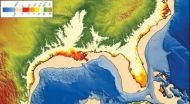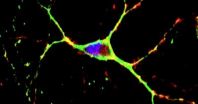(Press-News.org) Do costly seawalls provide a false sense of security in efforts to control nature? Would it be better to focus on far less expensive warning systems and improved evacuation procedures that can save many lives?
Seth Stein, a Northwestern University geologist, has teamed up with his father, Jerome Stein, an economist at Brown University, to develop new strategies to defend society against natural disasters like Hurricane Sandy as well as the effects of climate change.
The approach, which considers costs and benefits while looking for the best solution, is based on a mathematical technique called optimization.
The research is published in the October issue of the Geological Society of America journal GSA Today. The article is titled "Rebuilding Tohoku: a joint geophysical and economic framework for hazard mitigation."
"We're playing a high-stakes game against nature and often losing," said Seth Stein, the William Deering Professor of Geological Sciences in the Weinberg College of Arts and Sciences at Northwestern.
"Just in the past few years, both the Japanese tsunami and Hurricane Katrina did more than $100 billion in damage, despite expensive protection measures that were in place. Hurricane Sandy is likely to cost at least $20 billion," he said. "The question is how to do better. For example, should New York spend billions of dollars on a barrier to prevent flooding like the city saw this week?"
Both the U.S. and Japanese governments decided to rebuild the defenses that failed essentially to the level they were before, only better. These decisions have been questioned, Seth Stein said. Critics argue that coastal defenses in Louisiana and surroundings should be built not just to withstand a hurricane like Katrina, but much more powerful ones that are known to occur there.
The New York Times noted in discussing Japan's decision to rebuild the tsunami defenses: "Some critics have long argued that the construction of seawalls was a mistaken, hubristic effort to control nature as well as the kind of wasteful public works project that successive Japanese governments used to reward politically connected companies in flush times and to try to kick-start a stagnant economy."
The problem, explained Jerome Stein, is that the decisions on how to protect against these hazards are made politically without careful consideration of alternatives. "There are complicated choices that have to be made, given that we don't know when a similar event will happen," he said. "We need ways to consider a range of options, each of which has different costs and benefits, and help communities involved make the most informed choices."
The mathematical model the Steins have developed lets communities balance the costs and benefits of different strategies.
"We start from the losses that would occur if nothing was done to protect against future disasters and then calculate how much less they would be for increasing amounts of protection," said Jerome Stein, a professor emeritus of economics.
"That reduction is the benefit of more protection, but the increased protection also costs more," he said. "When you add the cost and benefit, you get a U-shaped curve with a minimum at the level of protection that is the best choice. More protection reduces losses, but the cost involved is more than that reduction. Less protection costs less, but produces higher losses. The bottom of the curve is the sweet spot."
Although global warming results largely from human actions, many of its effects are expected to appear as natural disasters like coastal flooding, severe weather or droughts. The Steins' mathematical optimization model could be applied to these situations, too.
"Nations around the world have to decide both how to reduce emissions of carbon dioxide that cause warming and how to adapt to the effects of warming," Seth Stein said. "Choosing policies to address these large-scale problems is a much more complicated version of addressing a specific hazard in a limited area, so considering costs and benefits and looking for good solutions is even more crucial."
### END
Disaster defense: Balancing costs and benefits
Father-son team has developed smart strategies for protection again natural disasters
2012-11-02
ELSE PRESS RELEASES FROM THIS DATE:
Were dinosaurs destined to be big? Testing Cope's rule
2012-11-02
Boulder, CO, USA – In the evolutionary long run, small critters tend to evolve into bigger beasts -- at least according to the idea attributed to paleontologist Edward Cope, now known as Cope's Rule. Using the latest advanced statistical modeling methods, a new test of this rule as it applies dinosaurs shows that Cope was right -- sometimes.
"For a long time, dinosaurs were thought to be the example of Cope's Rule," says Gene Hunt, curator in the Department of Paleobiology at the National Museum of Natural History (NMNH) in Washington, D.C. Other groups, particularly ...
Study: Alcohol, drug abuse counselors don't always require total abstinence
2012-11-02
WASHINGTON – Compared to a survey conducted nearly 20 years ago, about twice the proportion of addiction counselors now find it acceptable for at least some of their patients to have a drink occasionally – either as an intermediate goal or as their final treatment goal, according to a new study published by the American Psychological Association.
The researchers surveyed 913 members of the National Association of Alcoholism and Drug Addiction Counselors from across the United States. About 50 percent of the respondents said it would be acceptable if some of their clients ...
Difficult-to-read font reduces political polarity, study finds
2012-11-02
CHAMPAIGN, lll. — Liberals and conservatives who are polarized on certain politically charged subjects become more moderate when reading political arguments in a difficult-to-read font, researchers report in a new study. Likewise, people with induced bias for or against a defendant in a mock trial are less likely to act on that bias if they have to struggle to read the evidence against him.
The new research, reported in the Journal of Experimental Social Psychology, is one of two studies to show that subtle manipulations that affect how people take in information can ...
Abstract thinking can make you more politically moderate
2012-11-02
CHAMPAIGN, lll. — Partisans beware! Some of your most cherished political attitudes may be malleable! Researchers report that simply answering three "why" questions on an innocuous topic leads people to be more moderate in their views on an otherwise polarizing political issue.
The research, described in the journal Social Psychological and Personality Science, explored attitudes toward what some people refer to as the ground zero mosque, an Islamic community center and mosque built two blocks from the site of the former World Trade Center in New York City. When the Islamic ...
Researchers 'watch' antibiotics attack tuberculosis bacteria inside cells
2012-11-02
NEW YORK (Nov. 1, 2012) -- Weill Cornell Medical College researchers report that mass spectrometry, a tool currently used to detect and measure proteins and lipids, can also now allow biologists to "see" for the first time exactly how drugs work inside living cells to kill infectious microbes. As a result, scientists may be able to improve existing antibiotics and design new, smarter ones to fight deadly infections, such as tuberculosis. The new study was published in today's early online edition of Science.
"The development of antibiotics has been stalled for several ...
Why seas are rising ahead of predictions
2012-11-02
Boulder, CO, USA – Sea levels are rising faster than expected from global warming, and University of Colorado geologist Bill Hay has a good idea why. The last official IPCC report in 2007 projected a global sea level rise between 0.2 and 0.5 meters by the year 2100. But current sea-level rise measurements meet or exceed the high end of that range and suggest a rise of one meter or more by the end of the century.
"What's missing from the models used to forecast sea-level rise are critical feedbacks that speed everything up," says Hay. He will be presenting some of these ...
Bird tree tells new tale of evolution
2012-11-02
Contact:
Arne Mooers, 778.782.3979, amooers@sfu.ca
Carol Thorbes, PAMR, 778.782.3035, cthorbes@sfu.ca END ...
Berkeley Lab scientists help develop promising therapy for Huntington's disease
2012-11-02
There's new hope in the fight against Huntington's disease. A group of researchers that includes scientists from the U.S. Department of Energy's Lawrence Berkeley National Laboratory (Berkeley Lab) have designed a compound that suppresses symptoms of the devastating disease in mice.
The compound is a synthetic antioxidant that targets mitochondria, an organelle within cells that serves as a cell's power plant. Oxidative damage to mitochondria is implicated in many neurodegenerative diseases including Alzheimer's, Parkinson's, and Huntington's.
The scientists administered ...
The ins and outs of in-groups and out-groups
2012-11-02
We humans organize ourselves in myriad kinds of social groups, from scout troops and sports teams to networks of friends, colleagues, or classmates. But how do these social groups work? How do we decide whom to trust and whom to follow? And how do we deal with people that don't seem to fit the norms of our social groups?
New research published in Psychological Science, a journal of the Association for Psychological Science, explores these issues by examining various facets of social perception and behavior.
The Herding Hormone: Oxytocin Stimulates In-Group Conformity
Mirre ...
Bigger human genome pool uncovers rarer variants
2012-11-02
Contact:
Iman Hajirasouliha, 778.782.7040, 604.418.4834 (cell), imanh@sfu.ca
Carol Thorbes, PAMR, 778.782.3035, cthorbes@sfu.ca
Flickr: http://at.sfu.ca/skirFz END ...
LAST 30 PRESS RELEASES:
Scientists discover why we know when to stop scratching an itch
A hidden reason inner ear cells die – and what it means for preventing hearing loss
Researchers discover how tuberculosis bacteria use a “stealth” mechanism to evade the immune system
New microscopy technique lets scientists see cells in unprecedented detail and color
Sometimes less is more: Scientists rethink how to pack medicine into tiny delivery capsules
Scientists build low-cost microscope to study living cells in zero gravity
The Biophysical Journal names Denis V. Titov the 2025 Paper of the Year-Early Career Investigator awardee
Scientists show how your body senses cold—and why menthol feels cool
Scientists deliver new molecule for getting DNA into cells
Study reveals insights about brain regions linked to OCD, informing potential treatments
Does ocean saltiness influence El Niño?
2026 Young Investigators: ONR celebrates new talent tackling warfighter challenges
Genetics help explain who gets the ‘telltale tingle’ from music, art and literature
Many Americans misunderstand medical aid in dying laws
Researchers publish landmark infectious disease study in ‘Science’
New NSF award supports innovative role-playing game approach to strengthening research security in academia
Kumar named to ACMA Emerging Leaders Program for 2026
AI language models could transform aquatic environmental risk assessment
New isotope tools reveal hidden pathways reshaping the global nitrogen cycle
Study reveals how antibiotic structure controls removal from water using biochar
Why chronic pain lasts longer in women: Immune cells offer clues
Toxic exposure creates epigenetic disease risk over 20 generations
More time spent on social media linked to steroid use intentions among boys and men
New study suggests a “kick it while it’s down” approach to cancer treatment could improve cure rates
Milken Institute, Ann Theodore Foundation launch new grant to support clinical trial for potential sarcoidosis treatment
New strategies boost effectiveness of CAR-NK therapy against cancer
Study: Adolescent cannabis use linked to doubling risk of psychotic and bipolar disorders
Invisible harms: drug-related deaths spike after hurricanes and tropical storms
Adolescent cannabis use and risk of psychotic, bipolar, depressive, and anxiety disorders
Anxiety, depression, and care barriers in adults with intellectual and developmental disabilities
[Press-News.org] Disaster defense: Balancing costs and benefitsFather-son team has developed smart strategies for protection again natural disasters



